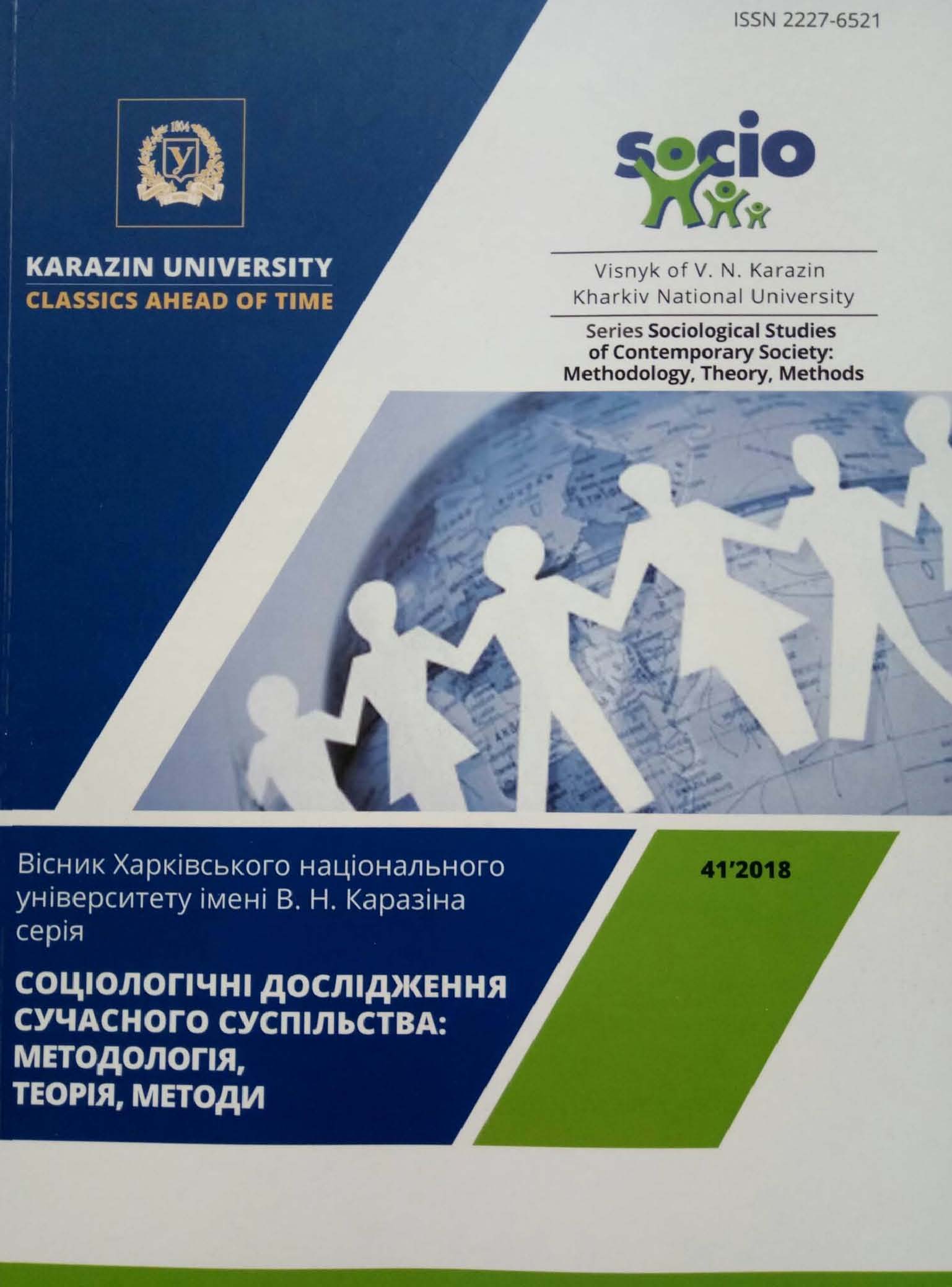Tipology of Value Orientations of Ukrainians (Based on the Data of European Social Survey)
Abstract
The article is devoted to the analysis of value orientations of Ukrainians based on the data of six waves of the European Social Survey (2004-2012). The aim is to identify the structure of Ukrainian society on the basis of the value orientations of respondents, obtained by the public opinion polling. The dynamics of this structure is also analyzed during 2004-2012. The concept of "value" in this article is defined within Schwartz's theory as desirable goals that go beyond specific situations, differ in importance from each other and are guiding principles in human life. The analysis uses the ten Schwarz's values, which are grouped into four value sectors, which are named «Conservation», «Self-Enhancement», «Self-Transcendence» and «Openness to Change». To identify the structure respondents were divided into three clusters, depending on the expressiveness of value orientations in each sector. The clustering was carried out using the k-means method, while the cluster centers were wrote based on the theoretical conception: the first cluster includes respondents with the most expressed values of «Self-Enhancement» and «Openness to Change», the second one – respondents with the most expressed values of «Self-Transcendence» and «Conservation», the third one – respondents who are closes to average values of all four sectors. The resulting cluster structure was identified in each of the six waves of the European Social Survey. At the same time clusters are differ in a number of socio-demographic indicators, as well as in some social orientations. The third cluster is biggest in the each wave of the survey. It means that the group of respondent who doesn’t have strongly expressed values of any of four sectors is the biggest. It can be explained by the phenomenon of ambivalence of the individual that means combination of views, thoughts, feelings, orientations that are mutually exclusive. It was also found that the trend of increasing the expressiveness of the values of «Self-Enhancement» and «Openness to Change», which manifests itself in the array as a whole, is also observed within the first and third clusters, but the value orientations of the second cluster remain relatively stable.
Downloads
References
Campbell J. B., Jayawickreme E., Hanson E. J. Chapter 18 Measures of Values and Moral Personality. Measures of Personality and Social Psychological Constructs, 1st Edition. Academic Press, 2014. 824p.
Rokeach M. The Nature of Human Values. New York: Free Press, 1973. 438 p.
Tuulik K., Õunapuu T., Kuimet K., Titov E. Rokeach’s instrumental and terminal values as descriptors of modern organization values. International Journal of Organizational Leadership, 2016. №5. P.151-161.
Schwartz S. H., Caprara G. V., Vecchione M., Bain P., Bianchi G., Caprara M. G., Cieciuch J. Basic Personal Values Underlie and Give Coherence to Political Values: A Cross National Study in 15 Countries. Political behavioral, 2014. №36, 4. P.899-930.
Schwartz S. H., Cieciuch J. Chapter 8 Values. The ITC International Handbook of Testing and Assessment. Oxford university press, 2016. 496 p.
Hills M. Kluckhohn and Strodtbeck's Values Orientation Theory. Online Readings in Psychology and Culture, 2002. №4,4. P.1-14.
Schwartz S. H. A Theory of Cultural Value Orientations: Explication and Applications. Comparative Sociology, 2006. № 5, 2-3. P.137-182.
Hitlin S., Piliavin J. A. Values: Reviving a Dormant Concept. Annual Review of Sociology, 2004. №30. P.359-393.
Hofstede G. Culture and Organizations. International Studies of Management & Organization, 1980/1981. №10,4. P.15-41.
Магун В., Руднев М., Шмидт П. Европейская ценностная типология и базовые ценности россиян. Вестник общественного мнения. Данные. Анализ. Дискуссии, 2015. №3-4(121). С.74–93.
Lee J. Schwartz values clusters in the United States and China. Journal of Cross-Cultural Psychology, 2011. №42. P.234–252.
Moors G. B. D., Vermunt J. Heterogeneity in post-materialist value priorities. Evidence from a latent class discrete choice approach. European Sociological Review, 2007. №23. P.631–648.
Schwartz S. H. An Overview of the Schwartz Theory of Basic Values. Online Readings in Psychology and Culture, 2012. № 2, 1. P.1-20.
Головаха Е., Панина Н. Постсоветская деинституционализация и формирование новых социальных институтов в Украине. Социология: теория, методы, маркетинг, 2001. № 4. С. 5-22.
Левченко О. Деякі аспекти трансформацій системи політичних цінностей сучасних українців. Наукові праці Чорноморського державного університету імені Петра Могили, 2010. Т. 149. №137. С. 11-13.





